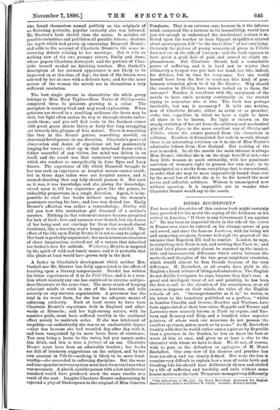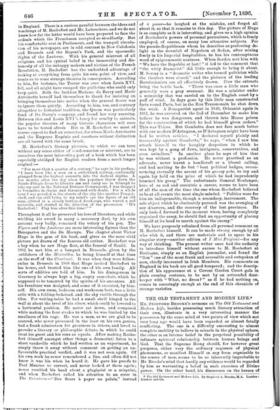HENRI ROCHEFORT.*
THE hero and chronicler of this curious book might certainly have parodied for his motto the saying of the Irishman on his arrival in America, If there is any Government I am against it." He has been an impartial thorn in the side of the rulers in France ever since he entered on his strange career of pen and sword, aad since the famous Lanterne, with its biting wit and unsparing savr.r,ery, became well-nigh the greatest of the enemies that Napoleon III. had to combat. London, he sap, is everything that Paris is not, and nothing that Paris is ; and in that brief phrase might almost be summed up the incalcu- lable and immeasurable difference which exists between the methods and thoughts of the two great neighbour countries, which should almost be firm friends because of the very difference. M. Rochefort, at all events, does yield to the English a frank tribute of liking and admiration. The English do not dislike foreigners, he says, because they don't care. A great and intelligent lover of art and painting, he has been the first to call to the attention of his countrymen, or at all events to impress on their minds, the value of the English schools of art. "Incomprehensible as it is," he writes, in his letter to the translator published as a preface, "whilst in London Chardin and Greuze, Boucher and Watteau, have been appreciated at their true value, Hogarth and Turner and Lawrence were scarcely known in Paris by repute, and Rae- burn and Romney and Etty, and a hundred other superior painters, of whose work our museums do not possess the smallest specimen, not so much as by name." As M. Rochefort frankly adds that he would rather annex a picture by Reynolds than a province in the Soudan, he lets us know the best or worst of him at once, and gives us at least a clue to the character with whom we have to deal. We do not, of course, wish to pose as the defenders or apologists of M. Henri Rochefort. Our own view of his theories and practice has been too often and too clearly defined. But none the less it remains very difficult to explain how a man of noble birth and breeding like his should have deliberately chosen and abided by a life of suffering and hardship and exile without some honest motives at the back. Things are managed very differently The Adventures of My Life. By Henri Rochefort. Arranged for Naiads Readers by the Author and Ernest W. Smith. London : Edward Arnold. in England. There is a curious parallel between the ideas and teachings of M. Rochefort and Mr. Labouchere, and we do not know how far the latter would have been prepared to face the ordeals which the Frenchman accepted so steadfastly. But his comfortable seat in Parliament, and the tranquil circula- tion of his newspaper, are in odd contrast to New Caledonia and Brussels and the Regent's Park, and the spasmodic flights of the Lanterne. With his general mistrust of all religions, and his cynical belief in the immorality and dis- honesty of all the unhappy makers and victims of the French Revolution, M. Rochefort has the undoubted advantage of looking at everything from quite his own point of view, and treats us to some strange theories in consequence. According to him, for instance, the Terror was over when Louis XVI. fell, and all might have escaped the guillotine who could only keep quiet. Both the luckless Madame du Barry and Marie Antoinette herself had themselves to thank for insisting on bringing themselves into notice when the general desire was to ignore them quietly. According to him, too, and contrary altogether to historical tradition, the Queen was particularly fond of Da Barry's company, and found her very amusing. Between this and Louis XVI 's fancy for cruelty to animals, the popular theories of many historic characters will soon have to be tested afresh But in M. Rochefort we must of course expect to find an iconoclast, for whom Marie Antoinette and the Empress Eugenie and courtiers without distinction
are all tarred with the same brush.
M. Rochefort's literary pictures, to which we can turn without any sense either of condemnation or mistrust, are to ourselves the most interesting part of a book which has been especially abridged for English readers from a much longer original :—
" For more than a quarter of a century," he says in his preface, "I have been like a man on a switchback railway, continually plunged from the highest summits into the darkest depths. A few months after the day when the populace threw down the Sainte-Pelagie doors to liberate me and carry me in triumph to take my seat in the National Defence Government, I was dragged to Versailles in chains and threatened with death. For a whole hour I was paraded in the streets of the city like another Pougat- cheff, and can still bring to my mind's eye the figure of an old man, attired in a closely buttoned frock-coat, who waved a red umbrella, and started in the direction of the procession. It's Rochefort ! Flay him alive this time !'"
Throughout it all he preserved his love of literature, and while wielding his sword in many a necessary duel, by his own
account very badly. remained the votary of his pen. The Figaro and the Lanterns are more interesting figures than the Bonapartes and the Be Mornys. The chapter about Victor Hugo is the gem of his book, and gives us the most vivid picture yet drawn of the famous old author. Rochefort was a boy when he saw Hugo first, at the funeral of Soulie. In 1862 he met him at a banquet in Brussels, given by the publishers of the Misgrables, he being himself at that time on the staff of the Charivari. It was when they were fellow- exiles in Brussels in 1868 that Hugo invited Rochefort to his house, and treated him like one of his own family. All
aorta of oddities are told of him. In his dining-room in Guernsey he always kept a big, empty arm-chair, which he supposed to be tenanted by the spirits of his ancestors. All his furniture was designed, and some of it executed, by him- self. His own room, bedroom and workroom both, was a little attic with a folding-bedstead. and the sky visible through the tiles. For writing-table he had a small shelf hinged to the wall at about the level of his elbow, which could be lowered to a horizontal position. He never sat down, and composed while making the four str ides to which he was limited by the smallness of his cage. He was a man, as we are glad to be assured, who never presumed in the least on his own genius, had a frank admiration for greatness in others, and loved to provoke a literary or philosophic debate, in which he could treat his guest and his sons as equals. After making Roche-
fort (himself amongst other things a dramatist) listen to a short vaudeville which he had written as an experiment, he simply threw it away without comment on getting an un- favourable practical verdict, and it was not seen again. Of his own work he never remembered a line, and often did not know it was his when he heard it. He gave his proofs to Paul Meurice to correct, and never looked at them again ; never troubled his head about a plagiarist or a misprint, and when Rochefort called his attention to an error in The Orientales—" Des fleurs k payer nu palais," instead of a paver—he laughed at the mistake, and forgot all about it, so that it remains to this day. The picture of Hugo is as complete as it is interesting, and gives us a high opinion of Rochefort's powers of personal portraiture, which is freely employed, of course, on many less attractive subjects. For the pseudo-Republicans whom he describes as professing de- light in the downfall of Napoleon at Sedan, after mixing freely in his Imperial hospitalities, he has his contemptuous word of epigrammatic neatness. When Sardou met him with "We have the Republic at last ! " it led to the comment that "the witty dramatist" did little enough to bring it about. M. Sarcey is a "dramatic writer who turned politician while the theatres were closed," and the pictures of the leading Revolutionists are all effectively drawn. How the extracts bring the battle back. "There was once a little man who generally wore a grey overcoat. He was a minister under a monarchy that was carried on to the English coast by a puff of wind. In days gone by this little man constructed forts round Paris, but in the Rue Transnonain he shot down the weak. A Bonapartist agent in 1849, Orleanist again in 1851, he was arrested on the 2nd of December to make him believe he was dangerous, and thrown into Mazes prison for the construction of which he had himself given orders." This was Thiers. But Gambetta does not fare much better with our modern D'Artagnan, as D'Artagnan might have been had he written articles. "I declared myself plainly and irrevocably against Gambetta," he says, "when I saw him attach Iiimstlf to the haughty despotism in which he was kept by a gang of Jews, intriguers, conservatives, and even swindlers." In another place he says of him that he was without a profession. He never practised as an advocate, never learnt a handicraft or a liberal calling, and had nothing to do but "beat political hedges, recom. mencing eternally the ascent of his greasy pole, to try and again lay hold on the prize of which he had imprudently loosened his grasp." The unfortunate General Boulanger, hero of so sad and eccentric a career, seems to have been of all the men of the time the one whom Rochefort believed to be at all events the most single-minded. "Politics were for him an indispensable, though a secondary, instrument. The sole object which he obstinately pursued was the avenging of our disasters, and the recovery of the lost provinces. He only looked forward to the moment when, having completely organised the army, he should find an opportunity of placing himself at its head to march against the enemy."
We have purposely refrained from all personal comment on M. Rochefort himself. It can be made strong enough by all who wish it, and there are materials and to spare in his singular story—another edition of I _Mei Prigioni—for any way of thinking. The present writer once had the audacity to introduce himself without excuse to IL Rochefort at Boulogne, simply as an English journalist, and found the "lion" one of the most frank and accessible and outspoken of men, chiefly interested in Irish Members. His comments on England in his book are all good tempered ; and the descrip. tion of his appearance at a Covent Garden Court gala in plain evening costume, to be met by an astounded door- keeper with "What, no dress ? " as if he had nothing on, comes in amusingly enough at the end of this chronicle of strange varieties.



















































 Previous page
Previous page